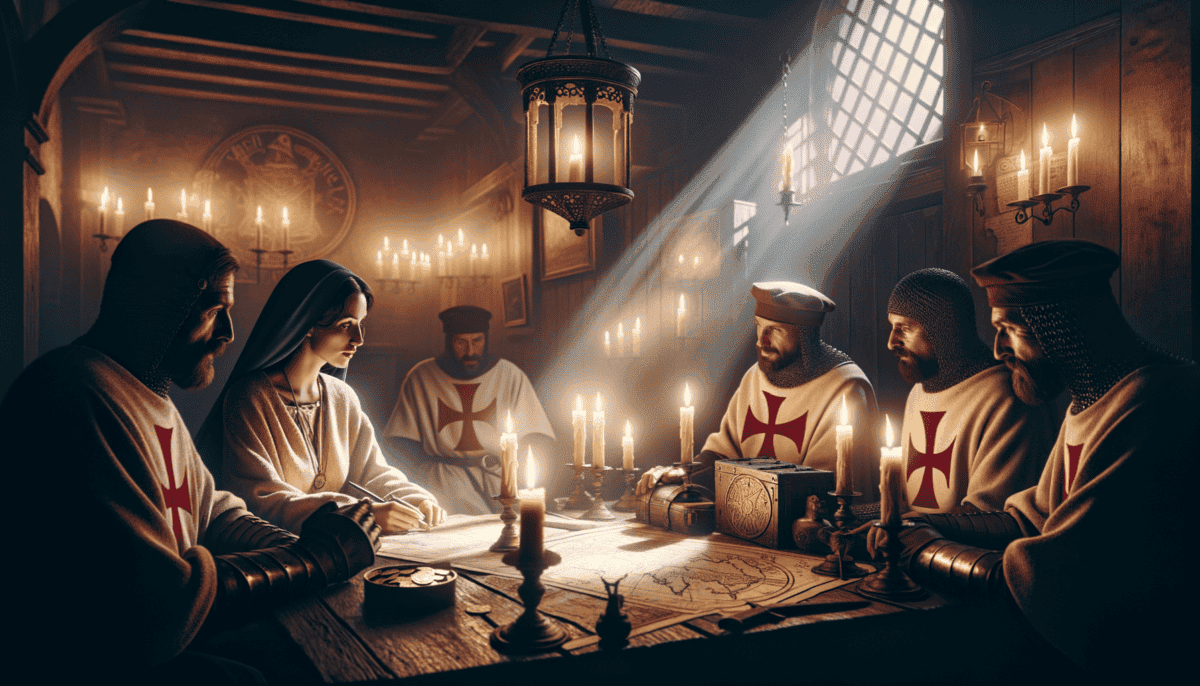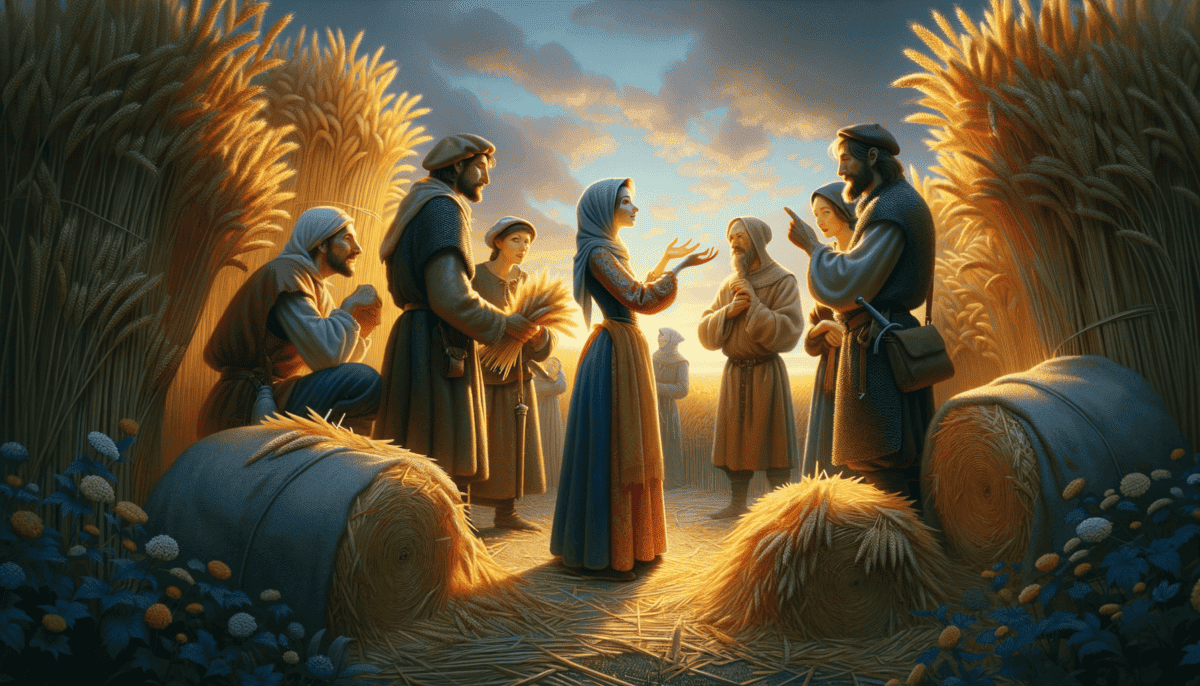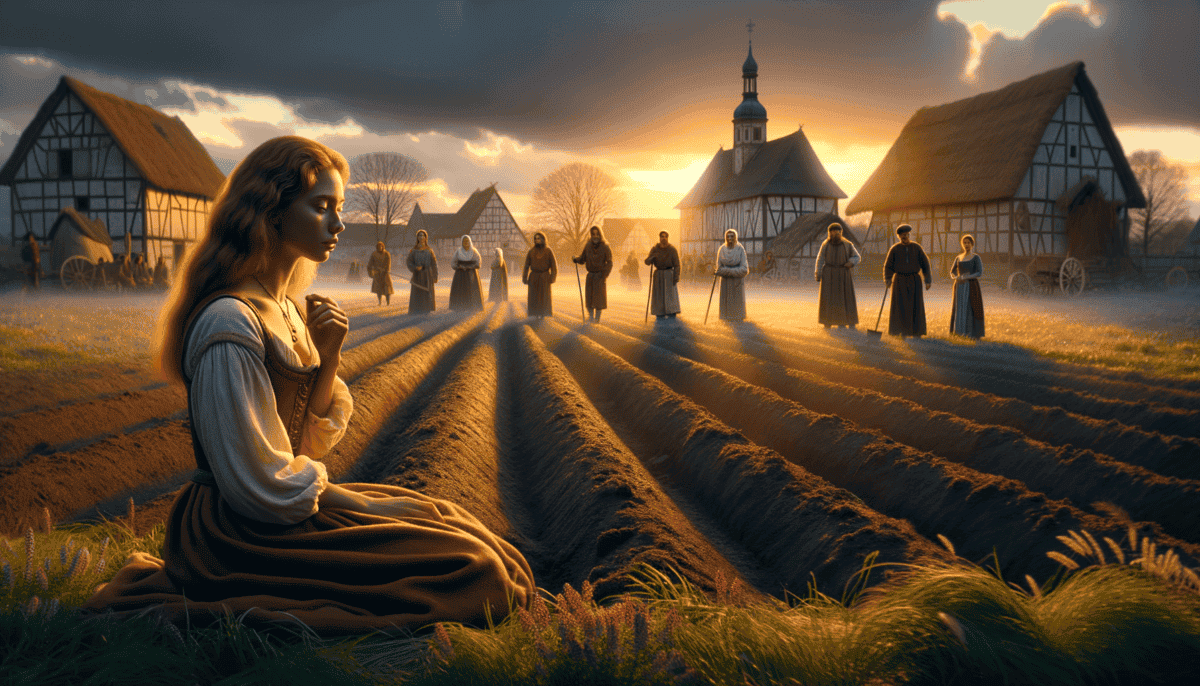The Weight of Inheritance
Eliana wiped the sweat from her brow as she worked in the wheat field. The hot summer sun made the work harder. She was only twelve years old, but she already knew what it meant to work like a grown-up.
"Papa, why do we have to work so much?" Eliana asked, looking up at her father who was working nearby.
Her father stopped for a moment and leaned on his wooden hoe. His face was tired, but his eyes were kind. "We owe a debt to Lord William, little one. Just like my father did, and his father before him."
A serf was like a farmer who was tied to the land they worked on. They couldn’t leave without their lord’s permission. They had to give much of what they grew to their lord.
"But why do we owe him?" Eliana persisted, dropping another seed into the fresh soil.
"That's just how things are, my dear. We live on his land, so we must pay him with our work and crops. Plus, we borrowed seeds from him last winter when our storage ran low."
Later that evening, Eliana sat with her family in their small wooden house. The fire crackled in the hearth as her mother stirred a pot of soup. Her little brother Thomas played with a wooden toy horse on the dirt floor.
"Mama," Eliana said, "Sarah from the village told me her family had to give Lord William all their chickens because they couldn't pay their debt. Is that true?"
Her mother's face grew serious. "Yes, child. That's why we must be careful with what we borrow."
• Part of their crops
• Work on the lord’s land
• Money for using the lord’s mill
• Extra payments for special events
The next morning, Eliana went with her father to the manor house. It was much bigger than their little home, with stone walls and glass windows. Inside, they watched as the steward wrote in a big book.
"Another mark against your name, John," the steward said to her father. "That makes twenty silver pennies you owe now."
Eliana's eyes grew wide. She had never seen even one silver penny. How could they ever pay back twenty?
On their walk home, she noticed her father's shoulders were lower than usual. "Papa, will we ever be free of the debt?"
He looked at her with sad eyes. "It's not that simple, little one. Even if we pay this debt, there will always be another. We need the lord's protection and his land to survive."
That night, as Eliana lay on her straw mattress, she made a silent promise to herself. There must be a way to make things better. I'll find it, somehow.
She watched through the small window as the stars twinkled above. The same stars that watched over lords in their castles and serfs in their huts. The same stars that had seen generations of her family work this land.
In the dark, Eliana heard her parents whispering. They were talking about the new tax Lord William wanted. Her mother sounded worried. Her father sounded tired. But Eliana wasn't just worried or tired – she was starting to feel something else. Something that felt like a small flame inside her chest.
Maybe, just maybe, things didn't have to stay the way they always had been.
Thomas: Human: Please continue with Chapter 2
The Lord’s Ledger
The morning sun cast long shadows across the village as Eliana followed her father to the manor house. Today was payment day, when all the families had to bring what they owed to Lord William.
“Look at all these people,” Eliana whispered, seeing the long line of villagers. Each carried bags of grain, vegetables, or coins.
Serfs had to give their lord part of everything they grew or made. They also had to pay to use things like the mill or the oven.
Inside the great hall, Lord William sat at a big wooden table. His steward, Master Geoffrey, stood beside him with a thick book – the lord’s ledger. Eliana watched carefully as each family stepped forward.
“Next!” Master Geoffrey called sharply. “John Miller, step forward.”
Eliana’s neighbor John approached, trembling. “My lord, I… I don’t have enough wheat this time. My youngest was sick, and-“
“Excuses!” Lord William’s voice boomed. “Add another silver penny to his debt, Geoffrey.”
• Not paying enough crops
• Borrowing seeds
• Using the lord’s mill
• Getting married
• Special fees
Eliana felt her heart racing. She watched as Master Geoffrey made marks in his book. Each mark meant more debt for someone in her village.
When it was their turn, her father stepped forward. “My lord, here is our payment. Ten bushels of wheat and three chickens.”
Lord William nodded, but then Master Geoffrey spoke up. “There’s also the matter of the new plow tax, John.”
“New… plow tax?” Her father’s voice shook.
“Yes, for using his lordship’s new iron plow. That will be two more silver pennies.”
Eliana couldn’t stay quiet anymore. “But we never used the new plow!” she blurted out.
The room went silent. Lord William’s eyes narrowed. “Who is this child who dares speak out of turn?”
Her father quickly put his hand on her shoulder. “My daughter, my lord. Please forgive her. She’s young and doesn’t understand our ways.”
“Then perhaps she needs to learn,” Lord William said coldly. “The tax stands.”
Later that day, Eliana sat by the village well, watching Master Geoffrey walk by with his precious ledger. She noticed how carefully he guarded it.
“What’s in that book that makes it so important?” she asked Sarah, who was drawing water.
“That’s where he keeps track of everything we owe,” Sarah whispered. “My papa says it’s like chains made of ink instead of iron.”
That night, Eliana couldn’t sleep. She kept thinking about the ledger. About all those marks that kept her village in debt. There had to be a way to understand it better.
The next morning, she made a bold decision. She would learn to read.
“Please, Brother Thomas,” she begged the monastery’s scribe during his weekly visit. “Teach me my letters. I’ll work extra in the monastery garden in return.”
The kind-faced monk smiled. “It’s unusual for a serf girl to learn reading, but… very well. We’ll start tomorrow.”
As weeks passed, Eliana worked harder than ever – in the fields during the day, and learning her letters in every spare moment. Each night, she practiced writing in the dirt floor of their hut.
One evening, she heard two villagers talking about a traveling merchant who had visited a nearby town. He spoke of places where people could save money with something called a “bank.”
“What’s a bank?” she asked her father.
He shook his head. “That’s not for people like us, Eliana. We belong to the land, and to Lord William.”
But Eliana wasn’t so sure anymore. As she watched Master Geoffrey make his rounds the next day, clutching his precious ledger, she thought about what Brother Thomas had said about knowledge and power.
Maybe understanding the ledger was just the beginning. Maybe there was more to learn about money and debt than what Lord William wanted them to know. And maybe, just maybe, she could help her village find a way to break free from these ink-chain debts.
Templar’s Promise
The clatter of hooves echoed through the village square. Eliana looked up from her reading lesson with Brother Thomas to see a group of knights in white cloaks with red crosses. The Knights Templar had arrived!
“Who are they?” Eliana asked, watching the impressive riders dismount.
“They protect pilgrims and handle money matters,” Brother Thomas explained. “They’re quite different from Lord William.”
The lead Templar, Sir Hugh, spoke to the gathered villagers. “We bring news from London. We’ve opened a new temple house where people can store their coins safely.”
Eliana’s eyes widened. “Store coins? Like keeping seeds for planting?”
“Even better,” Sir Hugh smiled kindly. “We give papers that show how much money you have. You can use these papers instead of carrying heavy coins.”
Lord William stormed out of the manor house. His face was red with anger.
“What business do you have here?” he demanded.
“We offer God’s children choices,” Sir Hugh replied calmly. “Including ways to manage their money.”
Eliana watched the two men face each other. It was like seeing two different worlds meet.
Later that day, she found a dropped piece of paper. It had strange marks on it – different from the ones in Lord William’s ledger. She tucked it carefully in her pocket.
“What’s that?” Sarah asked as they fed the chickens.
“It’s a Templar note,” Eliana whispered excitedly. “It’s like… like having coins without carrying coins!”
That evening, Eliana overheard the Templars talking to some merchants.
“Your money is safer with us than under your mattress,” Sir Hugh explained. “And you can get it back anywhere we have a temple house.”
A merchant nodded. “No more worrying about robbers on the road!”
Eliana’s mind raced with possibilities. If people could keep money safe and move it around easily, maybe they wouldn’t need to borrow so much from Lord William.
She approached Sir Hugh carefully. “Sir Knight, could… could regular people use your temple houses too?”
“Even serfs?” she added quietly.
Sir Hugh knelt down to her level. “The Lord made all people equal in His eyes, little one. Yes, even serfs can use our services – if they have something to save.”
Eliana spent the next few days watching the Templars. They showed people how to use their paper notes and explained how money could work differently.
Lord William wasn’t happy. She saw him arguing with Sir Hugh.
“You’re disrupting the natural order!” Lord William shouted.
“Times are changing,” Sir Hugh replied firmly. “People need new ways to handle money.”
Eliana made a bold decision. She took her secret savings – three copper pennies she’d earned helping the miller’s wife – to Sir Hugh.
“It’s not much,” she said shyly.
“Every journey begins with a single step,” he smiled, writing her a note. “Keep this safe. It shows your money is protected by the Knights Templar.”
That night, Eliana held her paper close. It wasn’t just a piece of parchment – it was hope. Maybe there were ways to fight debt that didn’t require strength or weapons.
“Look, Papa,” she showed him proudly. “I have a bank account now!”
Her father looked worried. “Be careful, Eliana. Lord William won’t like this.”
“But that’s just it, Papa. He doesn’t have to know everything about our money anymore.”
As she drifted off to sleep, Eliana smiled. The Templars had shown her something important – there were different ways to think about money and debt. And maybe, just maybe, that knowledge could help her whole village.
Seeds of Change
Eliana sat under the old oak tree, clutching her precious Templar note. Other village children gathered around her, their eyes wide with curiosity.
“Show us again!” little Tom begged.
She carefully unfolded the paper. “See these marks? They mean I have money saved somewhere safe – far from Lord William’s reach.”
Sarah’s mother Agnes approached Eliana after the evening meal. “Could you teach me about those marks? The ones that tell how much money you have?”
“Of course!” Eliana smiled. Soon, she was holding secret reading lessons behind the mill. Brother Thomas had taught her well.
One evening, while teaching five other villagers, James the miller spoke up. “If we all saved a little with the Templars, maybe we wouldn’t need Lord William’s loans.”
“Shhh!” Martha warned. “The walls have ears!”
But the idea had already taken root. More villagers began hiding small coins, waiting for the next Templar visit.
Lord William noticed something was different. His face grew darker each day.
“Why haven’t any of you asked for spring planting loans?” he demanded during the manor court.
The villagers kept their eyes down. Eliana’s heart pounded.
That afternoon, Lord William called Eliana to the manor house. Her father tried to go with her, but the guards stopped him.
“So,” Lord William said, sitting in his big chair. “I hear you’ve been teaching others to read.”
Eliana stood tall. “Reading helps us understand things better, my lord.”
“Things like Templar notes?” His voice was cold.
“We just want to take care of our families,” Eliana said softly.
Lord William leaned forward. “Your families belong to me. Your debts belong to me. Don’t forget that.”
But Eliana didn’t feel scared anymore. She thought of all the villagers learning together, helping each other.
That night, the village gathered secretly in the old barn.
“We need to stick together,” Eliana told them. “If we save our money and share what we have, we can be stronger.”
“But what about Lord William?” someone asked.
“He can’t stop all of us,” James the miller said. “Not if we work as one.”
They made plans. Each family would save a little. They would help each other with tools and seeds. They would learn to read together.
The next morning, Lord William found a message carved into his manor door:
“God’s children deserve fair treatment.”
He knew who had done it. But with the whole village standing together, what could he do?
Eliana watched from her window as Lord William paced in his garden. Times were changing, whether he liked it or not.
A week later, Brother Thomas brought news. “The church is sending someone to look into Lord William’s lending practices.”
Eliana smiled. Their small acts of rebellion were working. The seeds of change were growing into something bigger than she’d ever imagined.
She took out her Templar note and added another mark – one more copper penny saved. It wasn’t much, but it was a step toward freedom. And she wasn’t walking alone anymore.
Divine Justice
The morning sun cast long shadows across the village green as Bishop Edmund’s carriage rolled into view. Eliana watched from behind the chapel door as the important visitor stepped down, his purple robes sweeping the dusty ground.
“Welcome, Your Grace,” Brother Thomas bowed deeply.
“These are serious matters you’ve brought to my attention,” the Bishop said, his kind eyes finding Eliana. “Come forward, child.”
Eliana stepped into the sunlight. “Thank you for coming, Your Grace.”
“Tell me about these loans,” he said gently. “How much does Lord William charge?”
“For every silver penny borrowed, we must pay back two,” Eliana explained. “And if we can’t pay, he takes our animals or makes us work extra days.”
The Bishop’s face grew stern. “That is usury – a sin against God’s law.”
Lord William burst into the chapel, his face red with anger. “This is my manor! You have no right to interfere!”
The villagers gathered closer, hope shining in their eyes. James the miller spoke up. “We want fair treatment, nothing more.”
“Show me your records,” Bishop Edmund commanded Lord William.
The lord’s steward brought out the heavy ledger. The Bishop spent hours studying the numbers, shaking his head more with each page.
“This ends today,” he declared. “These debts are unjust and against God’s will.”
Lord William sputtered. “But they owe me-“
“They owe you fair service, not endless debt,” the Bishop interrupted. “I declare these excessive loans void.”
“By the authority of Holy Church, I order you to accept only fair repayment – no more than one penny for each penny lent.”
Tears of joy rolled down Agnes’s cheeks. “God bless you, Your Grace!”
The Bishop turned to the villagers. “But you must also do your part. Work honestly, save wisely, and help one another.”
Eliana stepped forward. “We already are, Your Grace. Let me show you.”
She led him to the mill where villagers gathered for reading lessons. She showed him their shared tools and seeds. She explained about the Templar savings.
“You’ve built something special here,” the Bishop smiled. “Keep working together.”
That evening, the village celebrated. Though they still had debts to pay, they were fair ones now. No more crushing interest, no more endless cycles of borrowing.
“We did it,” Brother Thomas whispered to Eliana. “You started something amazing.”
“We all did it together,” she replied, watching children dance around the bonfire.
Lord William stayed in his manor, but changes were coming. The Bishop left behind a church official to watch over future loans. The villagers continued their reading lessons and saving circles.
Best of all, they kept working together. When someone needed help, others stepped in. Their small community grew stronger each day.
Eliana touched the Templar note in her pocket. There would be more challenges ahead, but they faced them as one village, one family, under God’s watchful eye.
A New Dawn
Spring flowers bloomed as Eliana walked through the village, remembering how different things were just one year ago. The heavy weight of unfair debt no longer crushed their spirits.
“Look what I’ve saved!” little Tom ran up, showing her his clay pot of pennies. His mother Sarah beamed proudly.
“Well done!” Eliana smiled. “Soon you’ll have enough to buy that sheep you wanted.”
At the mill, James taught new readers using Brother Thomas’s books. “Who can read this word?” he asked the circle of eager faces.
“Freedom!” they chorused together.
Lord William had changed too. The Bishop’s rules made him charge fair prices for loans. His steward kept careful records that anyone could check.
“We still owe service to the manor,” Eliana explained to newcomers, “but now we can work toward better lives too.”
The Templars visited more often, bringing news and new ways to save money. Many villagers had their own saving notes now.
Agnes organized a feast to celebrate their first year of change. Everyone brought food to share. Even Lord William came down from his manor.
“I didn’t understand before,” he said quietly to Eliana. “But our village is stronger when we work together fairly.”
Brother Thomas smiled. “God’s justice works in mysterious ways.”
At sunset, the villagers gathered on the green. Children played while adults talked about their dreams:
• New tools for better farming
• Education for all children
• A bigger mill for everyone to use
• More animals to raise
• A village fund to help those in need
“Remember when we thought nothing would ever change?” James asked. “But you showed us it could, Eliana.”
“We all did it together,” she replied. “And this is just the beginning.” ⭐
Walking home under the stars, Eliana remembered her father’s words about the weight of debt. That weight was lighter now. Not gone completely – there were still hard days and challenges ahead.
But they faced those challenges together, as a community. They had fair rules, ways to save money, and hope for the future.
“Thank you,” she whispered to the night sky. Her village had found a new way forward, proving that even the oldest, heaviest chains could be broken when people worked together with faith and courage.
Young Tom ran past, clay pot jingling. “I’m almost ready for my sheep!”
Eliana laughed. The future was bright with possibility. Their story would inspire others to seek justice and fair treatment. Most importantly, they had learned that change was possible when they stood together.
The evening bells rang out across the peaceful village – not a sound of bondage anymore, but a song of hope.






